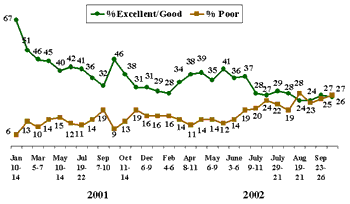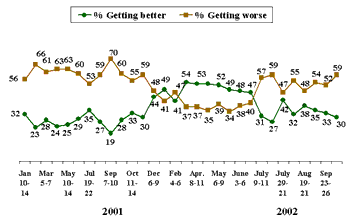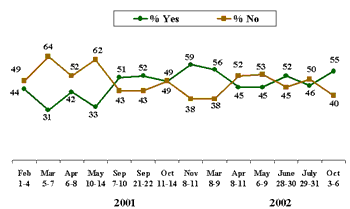GALLUP NEWS SERVICE
PRINCETON, NJ -- Americans continue to give the U.S. economy some of the lowest ratings we have seen in half a decade. A majority thinks the United States is still in a recession, and nearly six out of 10 say that the economy is getting worse, not better.
The latest CNN/USA Today/Gallup poll, conducted Oct. 3-6, shows no signs that the American consumer is getting any more positive about the current economy than has been the case in recent months, nor more positive about the prospects for the future.
Still, ratings of the current economy are not as negative as they were in the early 1990s, during the last major recession. And, despite poorer ratings of the economy this year, the percentage saying the economy is getting worse has remained slightly lower throughout 2002 than it was in 2001, when the public realized that the economic boom was truly over.
Ratings of the Current Economy
Here is the wording of the basic question Gallup uses to measure perceptions of the current state of the economy:
How would you rate economic conditions in this country today -- as excellent, good, only fair, or poor?
There is little doubt that positive assessments of the economy have generally been on a decline since reaching a high point in 1999 and 2000. That's no great surprise. From a situation in which 74% of the public rated the economy as "excellent" or "good" in those years, we have moved to a point at which 26% rate it as excellent or good.
The decline was obviously well in place before the Sept. 11, 2001 terrorist attacks. In the Gallup Poll conducted just before that date, Sept. 7-10, 2001, only 32% rated the economy as excellent or good and 19% rated it as "poor."
Since the Sept. 11 terrorist attacks, there has been a little movement in both the positive and negative direction. A little optimism crept into the thinking of Americans by May of this year, and at one point 41% rated the economy positively (that is, excellent or good) while the percentage rating it as poor declined to 12%.
That optimism was short-lived, however. In mid-August, the positive rating was 24% with a negative rating of 28%. That marked the first time since April 1994 that the "poor" percentage was lower than the excellent/good percentage. The current numbers of 26% positive, and 27% poor present essentially the same picture.
| Rating of Current Economic Conditions |
 |
Is Economy Getting Better or Worse?
A second question, which we track twice a month, asks Americans for their views on where the economy is headed -- is it getting better or getting worse? This measure is subject to more over-time variation than the basic "rate the current economy" measure discussed above. Americans apparently find it easier to change their minds fairly quickly about the direction the economy is taking than they do about their rating of how well it is doing at the current time.
For this reason, the "getting better/getting worse" measure serves in some ways as a more sensitive weather vane than the current conditions indicator:
Here are the basic data:
| Economic Conditions Getting Better or Getting Worse? |
 |
From a long-range perspective, these data show that the public began to show a growing unease as early as October 2000. The percentage of Americans saying that the economy was getting better declined from 60% in August to 39% in December. This drop in optimism continued throughout the first half of 2001. The percent of Americans saying the economy is getting better bottomed out at 19% just before the Sept. 11 terrorist attacks.
The public's optimism rallied after Sept. 11, at first perhaps as part of a more general unifying spirit that moved through the country after the attacks. By late spring of this year, the public seemed to be generally much more in tune with the feeling that the economy had turned a corner and was on an upward path. In a number of polls from March through May, more than half of Americans said that the economy was getting better.
The bottom fell out of this optimistic spirit by early summer, however. Now, in early October, we're in a situation in which 30% say the economy is getting better, and 59% say it is getting worse.
In context, these results, negative as they are, still show that the public is holding on to a little more optimism then they did in 2001, and in particular just before Sept. 11.
We also have a benchmark for this measure stretching back to the recession of the early 1990s. The low point was a "getting worse" mark of 71% in January 1992, 12 points more negative than our current reading.
Recession?
Is the U.S. economy in a recession? There was little doubt about the answer to that question back in January 1992, when a resounding 84% of Americans said yes. Once it was clear that the recession was over (by May 1994), we stopped asking the question. We began asking about a recession again in February 2001 as it became clear that the economy was moving sharply downward. At that point, 44% said that the country was in a recession. That percentage dropped by May of last year, but then zoomed up to 59% in November 2001. This year it has been lower at times, but our most recent early October poll finds that a majority of Americans -- 55% -- now say that the country is in a recession:
| Is the Economy Now in a Recession? |
 |
Who Is Most Pessimistic?
The table below displays the rank order of sub-groups within the U.S. population based on an index that subtracts the percentage of Americans rating the economy as poor from the percentage rating it as excellent or good.
As can been seen, there is an intriguing relationship between politics and rating of the economy. Republicans are by far the most likely to give the economy a positive rating, while liberals and Democrats are the most likely to rate it negatively. This no doubt reflects the influence of the president. Americans who identify with the party not in the White House tend to be more negative about everything that is going on in the country, while those whose party identification is the same as the president tend to be more positive. That is, in this case, Republicans may be more reluctant to rate the economy poorly when a Republican president is watching over it, whereas Democrats may be more likely to be critical of the economy in that situation.
Beyond political considerations, young Americans, and to a slightly lesser degree older Americans, are more positive than those who are middle aged. Nonwhites and those with annual household incomes below $20,000 are also among those giving the economy the lowest ratings:
HOW WOULD YOU RATE ECONOMIC CONDITIONS IN THIS COUNTRY TODAY:
|
2002 Oct 3-6 |
Economy Rating |
|
(Excellent+Good) - Poor |
|
|
Republican |
25 |
|
Conservative |
14 |
|
18- to 29-year-olds |
12 |
|
$20,000-$29,999 |
9 |
|
$75,000 or more |
8 |
|
Weekly church attendance |
4 |
|
South |
5 |
|
Men |
3 |
|
White |
2 |
|
Some college |
2 |
|
No children under 18 |
2 |
|
65 years and older |
1 |
|
Nearly weekly/monthly church attendance |
1 |
|
Total college |
0 |
|
$50,000- $74,999 |
0 |
|
$30,000-$49,999 |
0 |
|
Married |
0 |
|
Employed |
0 |
|
Union member |
0 |
|
Stock owner |
0 |
|
Total Sample |
-1 |
|
Moderate |
-1 |
|
High school or less |
-2 |
|
Non-Union member |
-2 |
|
Non-stock owners |
-2 |
|
East |
-3 |
|
College graduate |
-3 |
|
30- to 49-year-olds |
-4 |
|
Midwest |
-4 |
|
West |
-4 |
|
Single |
-4 |
|
Women |
-5 |
|
Children under 18 (Yes) |
-5 |
|
Postgraduate |
-6 |
|
Not employed |
-6 |
|
Seldom/Never attend church |
-6 |
|
50- to 64-year-olds |
-7 |
|
Independent |
-11 |
|
Nonwhite |
-12 |
|
Less than $20,000 |
-15 |
|
Democrat |
-17 |
|
Liberal |
-29 |
Survey Methods
These results are based on telephone interviews with a randomly selected national sample of 1,502 adults, aged 18 and older, conducted Oct. 3-6, 2002. For results based on this sample, one can say with 95% confidence that the maximum error attributable to sampling and other random effects is ±3 percentage points. In addition to sampling error, question wording and practical difficulties in conducting surveys can introduce error or bias into the findings of public opinion polls.
